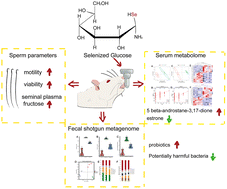Selenized glucose improves rat semen quality by improving the gut microbiota and serum metabolome†
Abstract
Selenium (Se), a well-known antioxidant, is important for male fertility and sperm quality. The gut microbiota is involved in vital activities and cross-talk between reproduction and the gut axis. It is still unclear whether the gut microbiota mediates the impact of selenium on semen quality, and what the underlying mechanisms may be. A selenized glucose (SeGlu) derivative is a novel organic Se compound. After 7 days of acclimation, the Sprague-Dawley (SD) male rats (230 g, 6 weeks) were divided into three drinking groups: deionized water group (CK), SeGlu 0.15 group (0.15 mg Se per L), and SeGlu 0.4 group (0.4 mg Se per L). All animals were euthanized 30 days post-treatment. Serum and intratesticular testosterone and semen parameters were measured. Metagenomic and non-targeted metabolomic approaches were used to study the effects of SeGlu on the gut microbiota and serum metabolites of rats. In both the SeGlu 0.15 Group and the SeGlu 0.4 Group, we found a significant increase in seminiferous epithelium thickness. While the SeGlu 0.4 Group had a tendency to increase with insignificant difference, the SeGlu 0.15 Group significantly improved the sperm viability, survival rate, and seminal plasma fructose. SeGlu had no effect on intratesticular testosterone levels, or abnormal sperm counts. Measured serum testosterone levels using ELISA and LC-MS, which showed a decreasing trend. ELISA did not reveal significant differences, but LC-MS indicated a significant decrease in SeGlu 0.4 group. Meanwhile, the SeGlu 0.15 Group reduced the abundance of harmful bacteria such as Rikenella, Barnesiella, Tenacibaculum, and Aeromonas while increasing the abundance of beneficial microbiota such as Intestinimonas, Christensenella, Coprococcus, and Butyrivibrio. Linear discriminant analysis Effect Size (LEfSe) identified the SeGlu 0.15 group's feature genera as Roseburia, Clostridium, Ruminococcus, and Eubacterium. Serum metabolites showed that the SeGlu 0.15 Group increased 5 beta-androstane-3,17-dione while decreasing estrone and 2-methoxyestradiol (2-MeOE2). In conclusion, the SeGlu 0.15 Group can significantly alter the levels of several sex hormones in serum, improve the quality of rats' sperm, and reduce harmful bacterial colonization. SeGlu 0.15 may be used as an effective dietary supplement.



 Please wait while we load your content...
Please wait while we load your content...